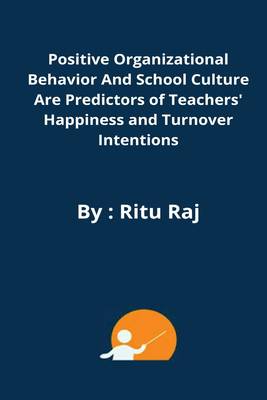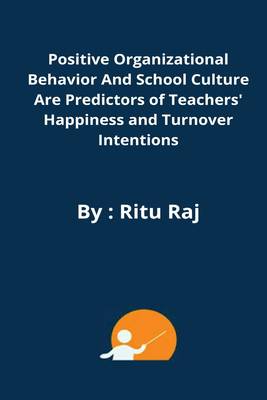
- Retrait gratuit dans votre magasin Club
- 7.000.000 titres dans notre catalogue
- Payer en toute sécurité
- Toujours un magasin près de chez vous
- Retrait gratuit dans votre magasin Club
- 7.000.0000 titres dans notre catalogue
- Payer en toute sécurité
- Toujours un magasin près de chez vous
Positive organizational behavior and school culture are predictors of teachers' happiness and turnover intentions
Ritu RajDescription
INTRODUCTION Since the dawn of the human civilizations, happiness has been a very important topic of scholarly discussions for philosophers, psychologists, academicians, researchers and administrators. With the formal establishment of Positive Psychology as a branch of Psychology in 2000, a new wave of interdisciplinary academic and scientific efforts began to explore positive aspects of human functioning. The Positive Psychology started as a movement against the prevailing line of inquiry which is mainly engulfed by negative aspects of life such as psychological disorders, mental illnesses and abnormalities in behaviour. The traditional Psychology devoted itself to understand work behaviour of individuals in organizational behavioural settings focusing on negative aspects of work behaviours such as workplace violence, job insecurity, the violence of psychological contracts, and downsizing (Turner, Barling & Zacharatos, 2002). 1.1 Happiness and Life Outcomes Happiness has been a cherished goal for people of all ages irrespective of their age, culture, gender and affiliations. Davitz (1970) has defined happiness as pleasant mood states. Likewise, Denmark and Iisager (1948) have conceived it as a dynamic change towards better conditions. In essence, happiness is a pleasurable condition characterized by satisfaction with life-as-a-whole. It has been argued that happiness is an experiential phenomenon that cannot be identified with particular external conditions or with a way of life. Happiness is not necessarily stable and it may change one person or moment to another person or moment. Happiness has been reported to be useful to explain many positive life outcomes. CHAPTER-1 INTRODUCTION Department of Psychology, Doctor Harisingh Gour Vishwavidyalaya, Sagar (M. P.) Page 2 Philosophers and social researches have tried to define happin,
Spécifications
Parties prenantes
- Auteur(s) :
- Editeur:
Contenu
- Nombre de pages :
- 124
- Langue:
- Anglais
Caractéristiques
- EAN:
- 9789805632173
- Date de parution :
- 07-07-22
- Format:
- Livre broché
- Format numérique:
- Trade paperback (VS)
- Dimensions :
- 152 mm x 229 mm
- Poids :
- 176 g

Les avis
Nous publions uniquement les avis qui respectent les conditions requises. Consultez nos conditions pour les avis.






